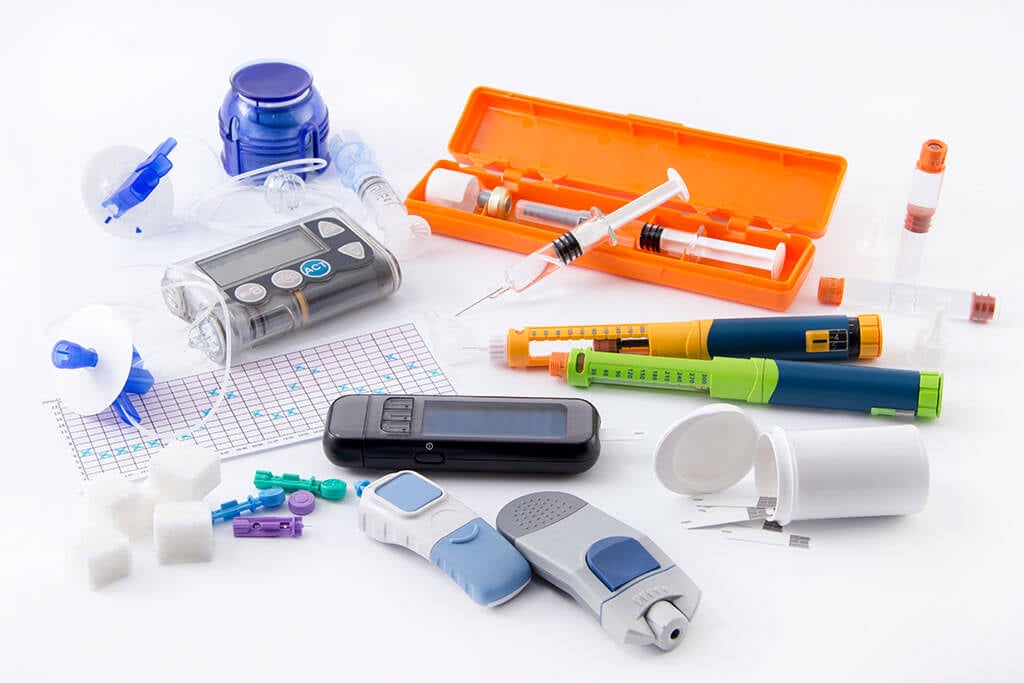Diabetes is a common, incurable endocrine disease that causes dangerous complications and significantly shortens a person's life span. Is it worth treating this disease abroad? To begin with, hospitals in European countries use the most advanced and innovative diabetes treatments that allow people with diabetes to lead as normal a life as possible.
Type 1 diabetes
Type 1 diabetes develops due to a deficiency of the hormone insulin. It is produced by the beta cells of the islets of Langerhans, which are located in the pancreas.
Insulin is a hormone that "helps" glucose to get out of the blood and into cells for further absorption. Therefore, with a deficiency of the hormone, glucose cannot enter the cell and remains in the blood. Its level in plasma increases, and this negatively affects the work of all organs and systems of the human body.
Characteristics of type 1 diabetes:
- Type 1 diabetes accounts for only 15% of all cases of diabetes.
- It is assumed that the disease develops due to the fact that a person’s own immune system destroys the cells that synthesise insulin.
- The disease mostly affects young people.
- The disease develops suddenly with rapid weight loss against the background of increased appetite and overeating. The condition is manifested by a significant increase in daily fluid intake and an increase in urine output (urination volume).
Type 2 diabetes
Type 2 diabetes develops due to a violation of the sensitivity of the receptors to insulin. Simply put, this hormone is produced in normal or even increased amounts, but the cells “do not recognize” it. Consequently, blood glucose level rises.
Characteristics of type 2 diabetes:
- The main cause of the development of type 2 diabetes is obesity.
- The condition mostly affects elderly or middle-aged people.
- The disease develops gradually and can be diagnosed during the initial stages only by chance.
- Type 2 diabetes is the most common type; and accounts for 85% of all cases of this condition.
Consequences of diabetes
In theory, if a patient with diabetes mellitus receives quality treatment and follows all the recommendations of an experienced and highly qualified endocrinologist, he can have the same quality and life expectancy as a healthy person. The situation is significantly different when the patient does not always receive appropriate treatment, does not adhere to a diet and does not follow the recommendations of a specialist.
The main reason for the patient's low adherence to treatment is that diabetes does not impair quality of life at the initial stage of its development. The condition is not accompanied by severe pain and does not limit the person's daily activities. It will take years before the patient's internal organs stop performing their functions. Then only patients begin treatment, but the therapy does not restore damaged nerves and blood vessels. This can only slow down the development of further complications.
The most dangerous are late (chronic) complications of diabetes. They develop in all patients who do not receive quality treatment:
- Polyneuropathy - nerve damage
- Microangiopathy and macroangiopathy - damage to small and large vessels
- Nephropathy – kidney failure
- Retinopathy – a gradual development of blindness due to the dystrophic processes in the retina
- Diabetic foot - a frequent cause of leg amputation
- Arthropathy - joint damage
- Encephalopathy - impaired brain function
These are just a few of the more common complications. In fact, there are many more of them. The main causes of death in patients with diabetes mellitus are heart attacks and strokes, which develop as a result of irreversible damage to blood vessels and their clotting.

Treatment of type 1 diabetes
The treatment of type 1 diabetes is based on the compensation of carbohydrate metabolism by injecting insulin. The pancreas does not produce sufficient amounts of insulin and therefore a person has to take daily injections.
Treatment of type 1 diabetes is based on compensating for carbohydrate metabolism by administering insulin. The pancreas does not make enough insulin, so the person has to have daily injections.
The main goals of treatment:
- Maintaining normal blood glucose levels
- Elimination of symptoms
- Prevention of early complications (diabetic coma)
- Delayed development of late complications
Therapy involves not only taking insulin preparations, but also a diet, moderate exercise. It is important to educate patients on how to manage their disease on their own, to provide them with information about diabetes and how to treat it.
As complications develop, additional treatment may be required. Various drugs, procedures and medical procedures can be used to slow the development of the condition. The goal is to compensate for the lack of functioning of the internal organs and to normalize the patient's quality of life and increase his life expectancy.
Treatment of type 2 diabetes
The treatment of type 2 diabetes is mostly based on the following:
- Diet to lose weight and decrease blood glucose level
- Physical activities
- Use of anti-diabetic drugs
Due to the increased secretion of insulin, cells in the pancreas can become depleted over time. They are responsible for the production of the hormone insulin. Consequently, even type 2 diabetes patients can become insulin dependent. In this case, the patient needs not only antidiabetic drugs, but also insulin injections.
There are also radical treatments. Metabolic surgery gives good results. The operation is aimed at reducing the size of the stomach or stopping the delivery of pancreatic juice to the food bolus in order to disrupt the digestion of food. This leads to gradual weight loss after surgery, which significantly improves carbohydrate metabolism.
Diabetes treatment in Germany
Doctors usually have serious difficulties in treating diabetes. There is no one-size-fits-all treatment regimen. Treatment should be customized based on:
- Diabetes type
- Degree of carbohydrate metabolism compensation
- Person’s lifestyle
- Patient’s age, physical abilities and self-service ability
- Comorbidities
- Certain complications of diabetes
German doctors have succeeded in treating both type 1 and 2 diabetes. Therefore, people from all over the world come to this European country to receive the best medical care.
Advantages of diabetes treatment abroad
- Using the latest treatment methods. There is a gradual withdrawal from daily insulin injections. Insulin pumps are becoming more and more popular in Germany, but are not available in some countries. They serve for the gradual automatic release of small doses of the hormone into the blood.
- Quality patient education on how to live with diabetes. After treatment, the patient not only improves his health, but also acquires all the necessary knowledge to treat the disease in the future.
- Unlike developing countries, Germany uses only modern and safe antidiabetic drugs. Due attention is paid not only to the effectiveness of therapy, but also to its tolerance.
- Germany provides quality treatment for diabetic complications. If possible, they are treated conservatively. If necessary, surgical treatment in the form of organ transplantation may be required.
- Diagnostic capabilities. Complications of diabetes are much easier to treat in the early stages. In German hospitals, high-quality, high-tech and accurate diagnostic methods are used, which detect any pathological processes at the very beginning of their development.
Innovative treatments
Germany offers many innovative diabetes treatments. We will focus on the main medical achievements of recent years in the field of endocrinology.
Transplantation of islets of Langerhans. The cells that synthesize insulin are transplanted into a person from a donor. They remain in the liver. The number of cells is gradually increasing. 58% of patients can completely eliminate the need for insulin injections after one year of surgery. However, graft rejection is still a problem. It should be suppressed with immunosuppressants.
Implantable bioartificial pancreas. It was first transplanted in Germany in Dresden in 2012. The islet cells of the pancreas have a special coating that protects them from being destroyed by immune cells. Clinical trials of this type 1 diabetes treatment have been ongoing since 2014.
Stem cell therapy. Stem cells are obtained from the patient's bone marrow. In the laboratory, they are differentiated to beta cells that synthesize insulin. They are then inserted into the pancreatic artery or calf muscles. The method of treatment allows to achieve long-term remission, which in some patients may last for several years.
DNA vaccination for diabetes. The BHT-3021 vaccine can be used for early type 1 diabetes. It prevents the cytotoxic action of killer T cells (immune cells) and protects the cells that synthesize insulin from destruction. This is a new treatment that is still in clinical trials. Therefore, the long-term results of this therapy have not yet been proven.
Other innovations in the treatment of diabetes:
- Insulin patches
- Laser sensors for home use; they measure blood glucose without a finger prick
- Systems for continuous monitoring of blood glucose concentration
- New insulin for inhalation
- A new group of anti-diabetic drugs-incretin mimetics
Germany offers all of the above and many more methods. This is where you can get the highest quality medical services using the latest methods of diagnosing and treating diabetes that have never been heard of, even in most countries.
How to choose a hospital?
It is better to be treated in a reputable medical center or university hospital where researches are carried out and innovative medicines are used.
The following German healthcare facilities provide quality diabetes care:
- Hospital Neuperlach Munich, Department of Endocrinology, Diabetology, Angiology and Internal Medicine
- University Hospital of Ludwig Maximilian University of Munich, Department of Endocrinology, Rheumatology and Nephrology
- University Hospital Carl Gustav Carus Dresden, Department of Endocrinology, Diabetology and Metabolic Disorders
- University Hospital Frankfurt am Main, Department of Gastroenterology, Hepatology, Pulmonology, Allergology, Endocrinology and Diabetology
- University Hospital RWTH Aachen, Department of Gastroenterology, Metabolic Disorders and Internal Intensive Care
The average cost of diagnostics and treatment of diabetes mellitus in specialized departments is as follows:
- Diagnostics of diabetes mellitus – 4,403 EUR
- Diagnostics and conservative treatment of diabetes mellitus – 10,683 EUR
- Stem cell treatment for diabetes mellitus – 22,983 EUR
How to undergo treatment abroad?
Use the international online platform bookinghealth.com to choose a suitable hospital with the best price, geographic location and quality of medical care. If you need the help of a medical consultant when choosing a program, leave your request on the website.
Booking Health is the medical tourism operator that has been organizing the treatment of people with diabetes mellitus from 75 countries in the world's leading hospitals for more than 10 years.
Booking Health offers help in such important aspects:
- Choosing the right clinic based on the success rates
- Establishing communication directly with your doctor
- Preparing medical program in advance, without repeating previous examinations
- Providing favorable costs, without overpricing and additional coefficients for foreign patients (saving up to 50%)
- Booking the appointment on the necessary date
- Monitoring medical program at all stages
- Help in buying and forwarding of medicines
- Communication with the clinic after treatment completion
- Control of invoices and return of unspent funds
- Organization of additional examinations
- Offering service of the highest level: booking hotels and plane tickets, transfer organization
- Services of a translator and a personal medical coordinator
Choose treatment abroad and you will get the best results surely!
Authors:
This article was edited by medical experts, board-certified doctors Dr. Nadezhda Ivanisova, and Dr. Bohdan Mykhalniuk. For the treatment of the conditions referred to in the article, you must consult a doctor; the information in the article is not intended for self-medication!
Our editorial policy, which details our commitment to accuracy and transparency, is available here. Click this link to review our policies.
Sources:
National Center for Biotechnology
Read:
Stem Cell Treatment for Diabetes Type 2 in Germany
Famous German quality or why treatment in Germany is so effective
Article menu:
Don't know where to start?
Contact Booking Health






